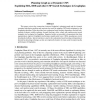Free Online Productivity Tools
i2Speak
i2Symbol
i2OCR
iTex2Img
iWeb2Print
iWeb2Shot
i2Type
iPdf2Split
iPdf2Merge
i2Bopomofo
i2Arabic
i2Style
i2Image
i2PDF
iLatex2Rtf
Sci2ools
JAIR
2000
2000
Planning Graph as a (Dynamic) CSP: Exploiting EBL, DDB and other CSP Search Techniques in Graphplan
This paper reviews the connections between Graphplan's planning-graph and the dynamic constraint satisfaction problem and motivates the need for adapting CSP search techniques to the Graphplan algorithm. It then describes how explanation based learning, dependency directed backtracking, dynamic variable ordering, forward checking, sticky values and random-restart search strategies can be adapted to Graphplan. Empirical results are provided to demonstrate that these augmentations improve Graphplan's performance significantly (up to 1000x speedups)on several benchmark problems. Special attention is paid to the explanation-based learning and dependency directed backtracking techniques as they are empirically found to be most useful in improving the performance of Graphplan.
| Added | 18 Dec 2010 |
| Updated | 18 Dec 2010 |
| Type | Journal |
| Year | 2000 |
| Where | JAIR |
| Authors | Subbarao Kambhampati |
Comments (0)

